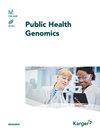接受TMEM43 p.S358L致心律失常性右室心肌病基因检测的参与者的心理困扰和生活质量:是时候提供基于人群的基因筛查了吗?
IF 1.3
4区 医学
Q4 GENETICS & HEREDITY
引用次数: 0
摘要
目的:我们在纽芬兰和拉布拉多(NL)鉴定了27个家族,他们的创始变异TMEM43 p.S358L负责1种形式的心律失常性右室心肌病。目前的筛查指南完全依赖于级联遗传筛查,这可能会导致未被识别的高风险携带者,他们将受益于预防性植入式心律转复除颤器治疗。本初步研究探讨了加拿大安大略省TMEM43 p.S358L基于人群的遗传筛查(PBGS)的可接受性。方法:一项前瞻性队列研究评估了未选择接受TMEM43 p.S358L变异遗传筛查的个体的态度、心理困扰和健康相关生活质量(QOL)。参与者(n = 73)通过广告招募,并在基线、6个月和1年完成2项调查,测量健康相关生活质量(SF-36v2)和心理困扰(事件影响量表)。结果:未发现变异阳性携带者。在那些通过电话问卷进行筛选的人中,>95%的人对TMEM43 p.S358L的群体遗传筛查持积极态度,尽管68%的人在看到广告后表示有一定程度的焦虑。在研究期间,与健康相关的生活质量或心理困扰评分没有显著变化。结论:尽管最初有一些焦虑,但我们支持在NL中TMEM43 p.S358L变体筛选为阴性的研究对象中使用PBGS。这些发现对该省未来的PBGS项目具有启示意义。本文章由计算机程序翻译,如有差异,请以英文原文为准。
Psychological Distress and Quality of Life in Participants Undergoing Genetic Testing for Arrhythmogenic Right Ventricular Cardiomyopathy Caused by TMEM43 p.S358L: Is It Time to Offer Population-Based Genetic Screening?
Purpose: We have identified 27 families in Newfoundland and Labrador (NL) with the founder variant TMEM43 p.S358L responsible for 1 form of arrhythmogenic right ventricular cardiomyopathy. Current screening guidelines rely solely on cascade genetic screening, which may result in unrecognized, high-risk carriers who would benefit from preemptive implantable cardioverter-defibrillator therapy. This pilot study explored the acceptability among subjects to TMEM43 p.S358L population-based genetic screening (PBGS) in this Canadian province. Methods: A prospective cohort study assessed attitudes, psychological distress, and health-related quality of life (QOL) in unselected individuals who underwent genetic screening for the TMEM43 p.S358L variant. Participants (n = 73) were recruited via advertisements and completed 2 surveys at baseline, 6 months, and 1 year which measured health-related QOL (SF-36v2) and psychological distress (Impact of Events Scale). Results: No variant-positive carriers were identified. Of those screened through a telephone questionnaire, >95% felt positive about population-genetic screening for TMEM43 p.S358L, though 68% reported some degree of anxiety after seeing the advertisement. There were no significant changes in health-related QOL or psychological distress scores over the study period. Conclusion: Despite some initial anxiety, we show support for PBGS among research subjects who screened negative for the TMEM43 p.S358L variant in NL. These findings have implications for future PBGS programs in the province.
求助全文
通过发布文献求助,成功后即可免费获取论文全文。
去求助
来源期刊

Public Health Genomics
医学-公共卫生、环境卫生与职业卫生
CiteScore
2.90
自引率
0.00%
发文量
14
审稿时长
>12 weeks
期刊介绍:
''Public Health Genomics'' is the leading international journal focusing on the timely translation of genome-based knowledge and technologies into public health, health policies, and healthcare as a whole. This peer-reviewed journal is a bimonthly forum featuring original papers, reviews, short communications, and policy statements. It is supplemented by topic-specific issues providing a comprehensive, holistic and ''all-inclusive'' picture of the chosen subject. Multidisciplinary in scope, it combines theoretical and empirical work from a range of disciplines, notably public health, molecular and medical sciences, the humanities and social sciences. In so doing, it also takes into account rapid scientific advances from fields such as systems biology, microbiomics, epigenomics or information and communication technologies as well as the hight potential of ''big data'' for public health.
 求助内容:
求助内容: 应助结果提醒方式:
应助结果提醒方式:


